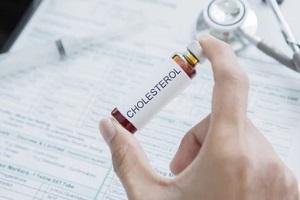 LDL cholesterol, known formally as low-density lipoprotein cholesterol, may seem like a convoluted term. It plays a crucial role in transferring lipids (fats) throughout our bodies, and a balance of LDL is essential for health.
LDL cholesterol, known formally as low-density lipoprotein cholesterol, may seem like a convoluted term. It plays a crucial role in transferring lipids (fats) throughout our bodies, and a balance of LDL is essential for health.
However, when levels rise too high, it’s akin to a seesaw tilting unfavorably in one direction, leading to health concerns. By understanding its causes, we can begin to wrestle control back from high LDL cholesterol.
Cholesterol: The Fundamentals
Picture cholesterol as a velvety, waxy, fat-like substance that helps our bodies function harmoniously by creating hormones, assisting digestion, or producing vitamin D. However, cholesterol isn’t a monolith.
Your body has to deal with two key types: LDL, the “bad guy,” and HDL (high-density lipoprotein), the “good guy.” When overproduced, LDL cholesterol deposits onto our arteries’ walls, causing potential obstruction. HDL, on the other hand, cleans your blood of LDL, lowering your heart disease risk.
Balancing LDL and HDL cholesterol is vital to attain and maintain your cholesterol at a healthy level. For most individuals, LDL should ideally be kept under 100 mg/dL. LDL levels above 160 mg/dL pose a serious warning signal indicating high LDL cholesterol. This imbalance can heighten the risk of cardiovascular conditions and stroke.
Identifying the Causes of High LDL Cholesterol
Now that we’ve established that high LDL cholesterol isn’t something you want, let’s look at what causes it.
Diet
 Eating a diet loaded with saturated and trans fats, which means eating a lot of red meat, full-fat dairy products, and processed foods, equates to a direct passport to high LDL cholesterol territory. Think of it as adding fuel to an already roaring fire – it’s not doing your LDL any favors. Instead, your goal should be to remove the oxygen to put the fire out.
Eating a diet loaded with saturated and trans fats, which means eating a lot of red meat, full-fat dairy products, and processed foods, equates to a direct passport to high LDL cholesterol territory. Think of it as adding fuel to an already roaring fire – it’s not doing your LDL any favors. Instead, your goal should be to remove the oxygen to put the fire out.
Lack of Physical Activity
Prioritizing regular exercise is just as important as eating healthily. Physical activity has a two-fold benefit on cholesterol levels – it boosts your body’s HDL levels and simultaneously diminishes LDL levels. Consider it vital maintenance for efficiently running your body’s inner workings.
Overweight and Obesity
Holding on to excess weight has a ripple effect on your overall health. It can lead to skyrocketing LDL cholesterol levels. Fat cells are not dormant. They actively store and dispense cholesterol into your bloodstream, directly contributing to the LDL load. The good news is that losing even a small percentage of your overall weight can do wonders for your high LDL cholesterol.
Smoking and Tobacco Use
Smoking is a formidable enemy to your health, specifically your cholesterol levels. The proliferation of chemicals in tobacco causes damage to your blood vessels, making them prone to accumulate fatty deposits. It also stifles your body’s HDL levels, giving LDL cholesterol free rein in your bloodstream. Quitting smoking helps with high LDL cholesterol and improves your overall health, so the faster you quit, the better.
Genes
Your genetic code significantly influences your LDL cholesterol. Genetic conditions, such as familial hypercholesterolemia, tamper with your body’s ability to regulate LDL, culminating in extraordinarily high LDL cholesterol.
Age and Gender: Inescapable Contributors to LDL Cholesterol
Unavoidable factors such as age and gender also play essential roles in regulating cholesterol levels. As we age, changes in our body’s biochemistry lead to naturally increased LDL cholesterol levels. Hormonal changes, especially in those assigned female at birth (AFAB) during menopause, can cause a surge in LDL levels.
The Hazards of High LDL Cholesterol
Left unchecked, high LDL cholesterol doesn’t merely remain a mild worry; it accelerates down a perilous path. It paves the way for atherosclerosis, where arteries harden owing to plaque buildup due to high LDL cholesterol. This sets the stage for more severe conditions, namely:
 Coronary Artery Disease: The accumulation of plaque narrows or obstructs the coronary arteries, which are the pathways that allow oxygen and nutrients to be transported to your heart. As a result, your heart isn’t getting the nutrients it needs. Still, it must also work harder to push blood around your body, potentially resulting in heart failure or a heart attack.
Coronary Artery Disease: The accumulation of plaque narrows or obstructs the coronary arteries, which are the pathways that allow oxygen and nutrients to be transported to your heart. As a result, your heart isn’t getting the nutrients it needs. Still, it must also work harder to push blood around your body, potentially resulting in heart failure or a heart attack.- Cerebrovascular Disease: Similarly, when the arteries that supply your brain with vital oxygen become clogged or obstructed, you can suffer a stroke.
- Peripheral Artery Disease: The result of narrowed blood vessels that impede optimal blood flow to your legs. The diminished blood flow can lead to discomfort and potentially make moving more challenging.
- Aortic Aneurysm: An aneurysm is a potentially lethal bulge in your body’s primary artery, which supplies your chest and torso with blood. The risk is that the aneurysm will rupture, leading to internal hemorrhaging.
Develop a High LDL Cholesterol Management Plan with Imperial Center Family Medicine
Understanding the causes of high LDL cholesterol equips you to manage your health better. While you can control some of these factors, that isn’t the case with other issues, such as genetics or hormonal changes. Yet, remember, it’s your response to these challenges that genuinely matters.
High LDL cholesterol isn’t a path you need to walk alone. Imperial Center Family Medicine offers personalized guidance and expertise to manage cholesterol levels and enhance well-being. Don’t hesitate to take this critical step for your health. Contact us today at 919-873-4437 or schedule an appointment online, and together, let’s foster a healthier future for you.
